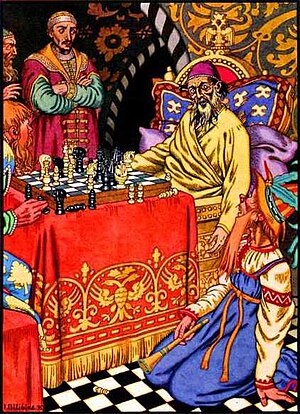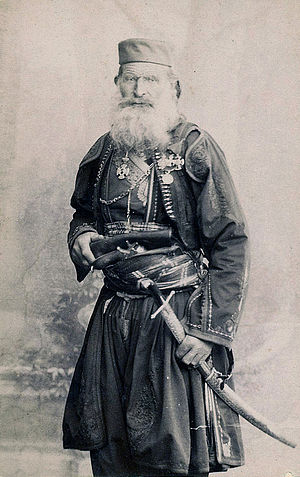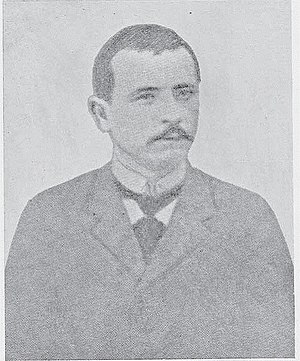Discover Your Roots
SIGN UPDiscover Your Roots
SIGN UPBogdan is a male name of Slavic origin, meaning "Given By God." It is used in all Slavic countries, Romania, and Moldova, both as a given name and a surname. The name is derived from the Slavic words "Bog/Boh," meaning "god," and "dan," meaning "given." It is possibly an early loan translation of the Greek name Theodore or the Hebrew name Matthew, both with similar meanings. Variants of the name include Bohdan, and the feminine version is Bogdana. The name has historical significance and is associated with various notable figures from medieval to modern times. Additionally, Bogdan is a common surname in certain regions, and notable individuals with the surname Bogdan include athletes, politicians, and artists. The name is celebrated on various name days in different Slavic countries and is also associated with similar-meaning names from other cultures, such as Theodore and Nathaniel.

Bogdan Yakovlevich Belsky, also known as Богдан Яковлевич Бельский, was a Russian statesman, oprichnik, and a close associate of Ivan the Terrible. He rose to prominence as the tsar's bodyguard and later became the closest confidant of Ivan the Terrible. Despite his loyalty and service to the tsar, he was never promoted to any significant post and faced several challenges, including accusations of plotting to murder Feodor I and attempting to seize the throne. After the death of Ivan, Belsky found himself entangled in the power struggles of the time, aligning himself with various factions and ultimately meeting a tragic end at the hands of a mob in 1611. His life and political maneuverings during the reigns of Ivan the Terrible, Boris Godunov, and the Time of Troubles are a testament to the complex and tumultuous nature of Russian politics during his era.References:"Bельский, Богдан Яковлевич" . Brockhaus and Efron Encyclopedic Dictionary (in Russian). 1906.

Bogdan Eugeniusz Arnold, born on 17 February 1933, was a notorious Polish serial killer who terrorized Katowice from October 1966 to May 1967, murdering four women. Arnold, an electrician by profession, developed a pattern of luring women to his apartment, where he brutally ended their lives and hid their bodies. His crimes were discovered when neighbors noticed a putrid smell emanating from his apartment, leading to the grim revelation of the hidden corpses. After a week of eluding authorities, he was eventually apprehended and confessed to his heinous acts, which included an attempted poisoning of his third wife. Despite showing no remorse, Arnold was sentenced to death by hanging and met his fate on 16 December 1968. His burial took place in an unmarked grave alongside other executed Polish criminals. Arnold's case remains a chilling reminder of the darkness that can dwell within seemingly ordinary individuals.

Bogdan Zimonjić (1813 – 21 January 1909) was a prominent Serbian Orthodox priest and Vojvoda (military commander) known for his pivotal role in two major uprisings against the Ottoman Empire in 19th-century Herzegovina. Alongside other freedom-fighting priests such as Jovica Ilić, Pavle Tvrtković, Mile Vitković, and Stevan Avramović, Zimonjić bravely rebelled against the occupiers, leaving an enduring mark in Serbian history. He is remembered for his unwavering commitment to the cause of liberation and justice. Zimonjić's son, Petar Zimonjić, who later became the metropolitan of Dabar-Bosnia, tragically fell victim to the Ustaše regime in the Independent State of Croatia in June 1941. Zimonjić's legacy continues to inspire and symbolize the resilience and courage of the Serbian people during challenging times. His contributions are documented in various historical sources, further cementing his significance in the collective memory of the nation.

Bogdan Suceavă, born on September 27, 1969, is a Romanian-American mathematician and writer. He is a professor of mathematics at California State University Fullerton and an honorary research professor at the STAR-UBB Institute, Babeș-Bolyai University, Cluj-Napoca, Romania. Suceavă's childhood in Curtea de Argeș, Romania, and exposure to Balkan folk-tales and myths from his maternal grandparents have greatly influenced his literary works. He pursued his education in mathematics at the University of Bucharest and Michigan State University, where he completed his doctorate under the supervision of Bang-Yen Chen.As a mathematics professor, Suceavă specializes in differential geometry, metric geometry, and the history of mathematics. He is actively involved in promoting mathematical research among young students in California and has published extensively in mathematical journals. Suceavă has also received recognition for his contributions, including the L. Donald Shields Excellence in Scholarship and Creativity Award and the Romanian Society for Mathematical Sciences Medal of Honor.Suceavă's notable publications include works in the Houston Journal of Mathematics, American Mathematical Monthly, and other mathematical gazettes. He has also delivered invited addresses at prestigious mathematical conferences and co-edited volumes dedicated to renowned mathematicians. His commitment to advancing mathematical knowledge and inspiring future mathematicians has solidified his reputation as a prominent figure in the field.

Bogdan Radenković (1874 – 1917) was a prominent figure in the Pan-Serb movement and a key organizer of the Serbian Chetnik Organization. Born in Srbovac, he served as a secretary to the Serbian Orthodox Metropolitanate of Skopje, where he had significant contacts with the Serbian people and consulates of Serbia, Russia, and France. Radenković was a leading activist in the Serbian Committee of Skopje and played a crucial role in organizing the Serbian Chetnik action in the Ottoman Empire. He was also instrumental in founding the Serb Democratic League, the first political party representing the interests of Serbs in the Ottoman Empire. Additionally, he was one of the initiators of the infamous "Unification or Death" organization, commonly known as the Black Hand. Radenković's influence extended to his involvement in negotiating with the Young Turk Board and urging the Turkish authorities to halt violence against the Serbian population. His significant contributions and leadership in various political and nationalist movements in the early 20th century mark him as a pivotal figure in Serbian history.
All images displayed on this page are sourced from Wikipedia or Wikimedia Commons.We use these images under their respective Creative Commons or public domain licenses. Wherever applicable, author attributions and license information are provided. If you believe an image is used incorrectly or outside its license terms, please contact us so that we can review and correct the issue.